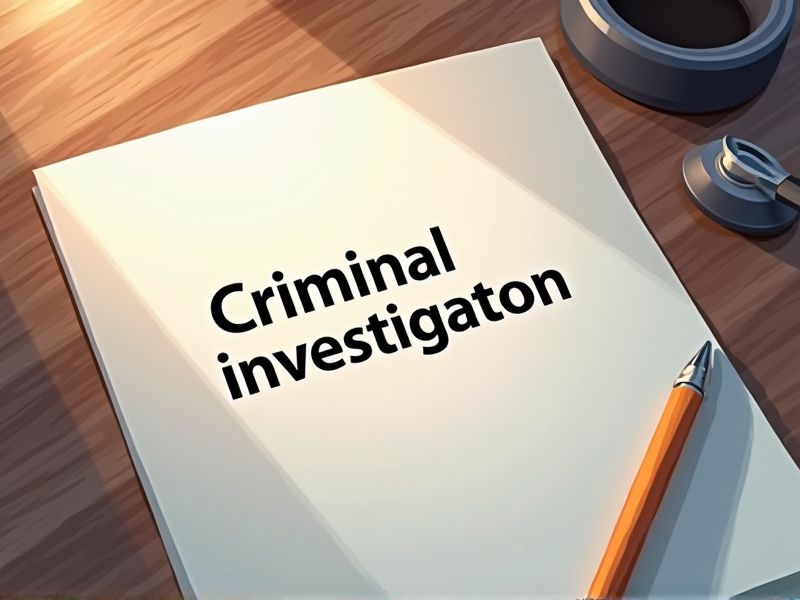
Criminal investigators require certain certifications to ensure they possess the skills necessary for effective crime-solving and evidence analysis. These certifications validate proficiency in forensic techniques, legal procedures, and criminology, enhancing the investigator's ability to deliver accurate results. As criminal investigations become increasingly complex, the need for certified expertise in specific areas such as cybercrime and homicide investigation grows. Here are some crucial certifications a criminal investigator may need.
Certified Criminal Investigator (CCI)
The complexity of modern crime necessitates specialized knowledge, which a Certified Criminal Investigator (CCI) provides. Certification ensures investigators are equipped with advanced skills in evidence collection and legal procedures, reducing errors in investigations. Rigorous training associated with CCI certifies competency in rapidly evolving technology used in crimes. Increased public trust and confidence in law enforcement can be linked to the professionalism and expertise CCIs bring to criminal investigations.
Certified Crime Scene Investigator (CCSI)
Certified Crime Scene Investigators (CCSI) provide crucial expertise in analyzing and preserving physical evidence, enhancing the reliability of criminal investigations. Their specialized training ensures the meticulous documentation and collection of evidence, which can directly influence the outcome of court proceedings. By utilizing established protocols, CCSIs maintain the integrity of a crime scene, reducing the risk of contamination or loss of critical data. The insights and analysis offered by such certification support investigators in constructing a comprehensive and accurate narrative of criminal events.
Certified Forensic Interviewer (CFI)
The need for a Certified Forensic Interviewer (CFI) in criminal investigations stems from their expertise in obtaining accurate and reliable information through structured interviews. CFIs are adept at identifying verbal and non-verbal cues, which helps in discerning truthfulness and detecting deception. Their training minimizes false confessions and enhances the overall integrity of the investigative process. They also ensure that interviews comply with legal standards, thereby reducing the risk of evidence being inadmissible in court.
Certified Fraud Examiner (CFE)
Certified Fraud Examiners bring specialized knowledge in detecting and understanding complex financial crimes, which enhances a criminal investigator's ability to identify fraudulent activities. Their expertise in fraud prevention and detection techniques aids in the creation of more efficient investigation strategies. CFEs possess skills in forensic accounting and data analysis, crucial for uncovering intricate financial schemes. The CFE credential also adds credibility to an investigator's findings, which is essential in legal proceedings.
Certified Forensic Computer Examiner (CFCE)
The role of a Certified Forensic Computer Examiner (CFCE) is crucial because digital evidence often plays a pivotal role in modern criminal investigations, helping to establish timelines and connections between suspects and incidents. CFCEs possess specialized skills to recover, analyze, and authenticate digital data, ensuring that crucial evidence is both reliable and admissible in court. As cybercrime and digital components in traditional crimes increase, investigators without such expertise might miss or mishandle key electronic evidence. Ensuring a thorough and accurate analysis of digital evidence can significantly influence the outcome of investigations, leading to more informed legal proceedings.
Certified Digital Forensics Examiner (CDFE)
Certified Digital Forensics Examiners (CDFE) play a crucial role in criminal investigations as they provide technical expertise in retrieving and analyzing digital evidence. The increasing prevalence of digital devices in criminal activities necessitates investigators who can extract and interpret data from various electronic sources. Their skills help in piecing together evidence from devices like smartphones, computers, and the internet, which often contain crucial information for solving cases. Having a CDFE ensures that digital evidence is handled with precision and in compliance with legal standards, bolstering the integrity of the investigation.
Certified Homicide Investigator (CHI)
The presence of a Certified Homicide Investigator (CHI) enhances the credibility and accuracy of homicide investigations by ensuring that investigators are well-trained in specialized techniques. CHI certification provides investigators with a comprehensive understanding of forensic science, which is crucial for solving complex cases. With the ever-evolving nature of criminal tactics, a CHI helps in staying updated with the latest methodologies and technologies in homicide investigations. A CHI designation reassures the community and justice system that investigations are conducted with a high level of professionalism and adherence to legal standards.
Advanced Criminal Investigation Certification (ACIC)
Advanced Criminal Investigation Certification equips criminal investigators with specialized skills and knowledge, enhancing their capacity to solve complex cases. This certification fosters credibility and trust among peers and in legal proceedings, as it demonstrates a commitment to maintaining high professional standards. Enhanced investigative techniques acquired through ACIC training can lead to more accurate case resolutions and efficient resource usage. Ongoing education helps investigators stay updated on evolving criminal patterns and technologies, crucial for adapting to sophisticated criminal tactics.
Forensic Accounting Certification (FAC)
A Forensic Accounting Certification equips criminal investigators with specialized skills to understand financial data patterns and detect fraud. Training in forensic accounting enhances their ability to analyze complex financial documents, crucial for solving financial crimes. Certified investigators gain proficiency in tracing illicit financial transactions, which aids in building stronger legal cases. Employing such certified professionals can increase the successful prosecution rate in crimes involving financial misconduct.
Certified Intelligence Analyst (CIA)
Criminal investigators require the expertise of a Certified Intelligence Analyst (CIA) to interpret complex data patterns, enhancing evidence-based decision-making. The CIA qualification equips analysts with skills in threat analysis, crucial for predicting criminal activities and strategizing preventive measures. Collaborating with CIAs can lead to the development of precise profiles, aiding in the apprehension and prosecution of suspects. Intelligence analysts are adept at leveraging technological tools, assisting investigators in quickly identifying and mitigating potential threats.
Summary
As a reader, if you become a certified criminal investigator, you can expect enhanced credibility in your field. Certifications often lead to a deeper understanding of investigative techniques, elevating your efficiency in solving cases. With additional credentials, your career advancement opportunities may increase, positioning you for higher-level responsibilities. The knowledge gained through certification can also result in more effective communication with law enforcement and legal professionals.
